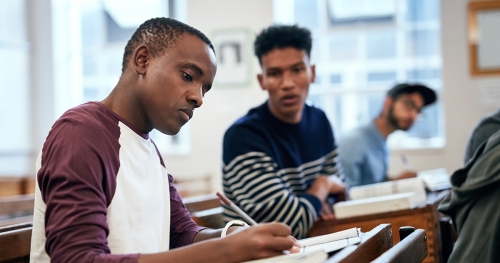A Mixed-Methods Evaluation of the Male Student Success Initiative for Men of Color
Men of Color College Achievement (MoCCA) Project

Overview
Men of color bring a variety of strengths and assets to their college experience. However, research to date indicates that three primary hurdles inhibit college completion for many male students of color:
-
Inadequate social, emotional, and campus support
-
Insufficient college preparation and academic achievement
-
Nonacademic barriers to persistence
Increased attention has been devoted to these challenges both inside and outside of academia, and postsecondary institutions around the country are joining networks to uncover best practices to improve outcomes for male students of color. Descriptive qualitative and quantitative research supports the development of culturally relevant strategies to address these barriers, but little causal evidence exists about their effectiveness.
To help provide causal evidence on what program features best support persistence and degree completion for men of color, MDRC is partnering with the Community College of Baltimore County (CCBC) through the Men of Color College Achievement (MoCCA) Project to refine and evaluate Academic Development 101 for Male Students of Color and the Male Student Success Initiative (ACDV-MSSI), a culturally relevant student success course combined with additional comprehensive services such as mentoring and academic development workshops. ACDV-MSSI aims to increase enrollment, retention, and graduation for male students of color by aiding them in developing a supportive network of CCBC faculty and administrators.
The MoCCA Project will conduct a randomized controlled trial impact study to detect the effects of ACDV-MSSI on student academic outcomes. The project will also employ a mixed-methods approach to assess the implementation of ACDV-MSSI and how it differs from CCBC’s other student support services; to understand the students’ backgrounds, experiences, and social support networks; and to analyze the program’s costs.
Additional Project Details
Agenda, Scope, and Goals
As part of its commitment to improving equity at its institution, Community College of Baltimore County (CCBC) offers ACDV-MSSI, a program that combines two interventions: Academic Development 101 (ACDV 101) for Men of Color and the Male Student Success Imitative (MSSI). ACDV 101 for Men of Color consists of a small number of sections of ACDV 101, a mandatory, one-credit college transition course that can be applied toward the earning of a degree. Since 2004, the ACDV 101 for Men of Color puts the required course materials in context and is typically taught by African-American male instructors with special training in stereotype threat, implicit bias, and making ACDV 101 content culturally relevant for their students. This variant of ACDV 101 moves beyond offering basic information on CCBC’s support services: It focuses on helping students develop productive relationships; providing support with navigating life issues that affect male students of color disproportionately; augmenting students’ academic success and technology skills; helping students understand the culture of higher education; and fostering greater aspirational college and career goals. MSSI, developed in 2014, pairs CCBC staff members who serve as Success Mentors with male students of color. The Success Mentors work one-on-one with the students to provide mentoring and academic coaching. The Success Mentors also encourage students to seek out and obtain help by referring them to specific college staff and faculty members for tutoring, academic counseling, financial aid, or other services on campus as appropriate. MSSI also hosts a variety of additional services and programming to assist with students’ academic, professional, financial, and social-emotional development.
As one combined and integrated program, ACDV-MSSI proposes to improve academic outcomes for male students of color by providing a supportive and comprehensive ecosystem of faculty and administrators who are familiar with ACDV-MSSI and who become part of the students’ social support network.
The MoCCA Project aims to answer these questions:
-
Does ACDV-MSSI operate as its designers intended?
-
Do ACDV-MSSI’s program features and usage represent a substantially different experience from the status quo?
-
What are the impacts of the programs on short-term outcomes such as persistence and grade point average (GPA), and on longer-term outcomes such as progress to graduation and degree completion or transfer?
-
What are the costs of operating ACDV-MSSI, and is ACDV-MSSI more cost-effective than the status quo?
-
Do program and control group students use campus support services differently? Do program and control group students interact with services staff members differently? How and why do students use campus services?
-
Do the background experiences of the students reflect the factors identified in the research literature as inhibiting college completion among men of color?
- Who are the members of students’ social support networks? How do these reported networks differ in size and make-up? How do these connections relate to mediators like academic self-efficacy ― that is, confidence that one can succeed academically ― and positive relationships with adults?
Design, Sites, and Data Sources
The MoCCA Project includes four major components:
-
Randomized controlled trial. This evaluation will show whether ACDV-MSSI causes changes in student outcomes such as year-to-year persistence, GPA, transfer to a four-year university, and graduation.
-
Implementation study. This study will describe whether and how ACDV-MSSI provides male students of color with substantially different support from CCBC’s other services, and whether ACDV-MSSI students use more of or perceive more value from ACDV-MSSI services than those available on campus generally. This study will use a mix of administrative records, observations of the program, and interviews with college staff and students.
-
In-depth qualitative research. This research will explore how the students’ backgrounds affect them. Insights from this research can inform CCBC and other similar institutions about the ways colleges may better serve similar students. This research will also explore the extent of social systems available to students, how students use members of their social support networks to persist and succeed in school, and how being part of a community like ACDV-MSSI acts as a buffer to the potential discomforts of the postsecondary experience.
-
Cost analysis of ACDV-MSSI. This study will record the resources required to implement ACDV-MSSI as both a complement to the implementation study and to help others determine what is required to replicate and support this program.
The MoCCA Project will primarily involve first-time college students who identify as men of color and will collect data on these students’ progress through college for two years.
Featured Work
Early Implementation Findings from a Study of the Male Student Success Initiative








